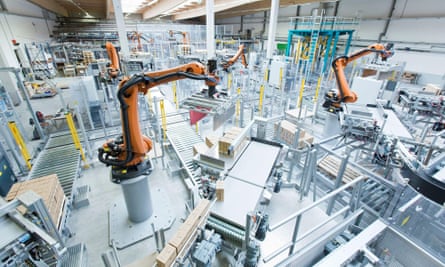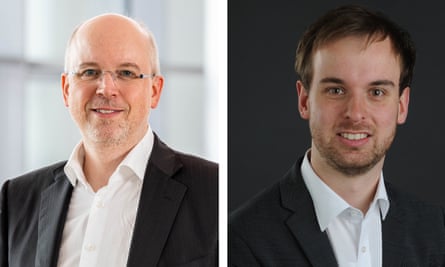
Carbon-spewing factories that fuel global warming could become a thing of the past if manufacturers use the latest digital technology to slash carbon emissions and boost energy efficiency.
The manufacturing industry accounts for almost a quarter of carbon emissions globally and must change its ways or bear responsibility for contributing to catastrophic climate change, according to the latest report from the United Nations’ Intergovernmental Panel on Climate Change (IPCC). As the body urges manufacturers to usher in new, sustainable production processes, businesses are turning to advanced digital technology in an attempt to cut carbon emissions.
A suite of technologies known as the fourth industrial revolution – including systems such as robotics, artificial intelligence (AI), decentralised edge computing and data trend monitoring – is helping to make factories more efficient and sustainable.
“What this fourth industrial revolution technology offers us is very detailed data resulting in greater global transparency and visibility,” says Johannes Holtbrügge, senior manager for digital transformation at Henkel, a global manufacturer for adhesive technologies and consumer goods. “That allows a business like ours to understand where we can cut energy usage, as well as find ways of reducing waste and excessive water consumption, helping us to have a positive impact on the environment,” he says.
Henkel’s Laundry and Home Care business unit makes detergent brands such as Bloo, Colour Catcher, Dylong and Jeyes, and the company is looking to the new technology to help it remove all carbon emissions from its production processes and become a climate-positive company by 2030 – meaning surplus CO2-free energy produced can be used by third parties.

Starting in 2013, Henkel began installing thousands of sensors in its 30 Laundry and Home Care factories worldwide, measuring everything from electricity consumption to water pressure in real time. “This has brought us transparency and insight and has enabled us to benchmark and compare factories so that they can learn from each other. Clever use of this data has helped us to reduce our energy consumption and slash waste,” says Holtbrügge.
Previously, energy usage was measured by sending an engineer to read the meter. With the network of sensors, a continuous flow of data is available about energy use, water consumption and gas supply from factories across the US, north America, Asia, Africa and Europe. This data can, for instance, be combined and analysed to show how compressed air that powers machinery can be used and distributed efficiently. Or if the sensors alert engineers to a sudden drop in water pressure, that suggests there must be a leak somewhere. Speedy location of leaks reduces water consumption. Before the sensors, it could have taken days to become aware that there was a fault.
Meanwhile, connecting factory workers digitally is also paying environmental dividends. Safety inspections in the factories are conducted by staff equipped with iPads, enabling them to record anomalies on an app and document them with photos. Previously, inspections were recorded on paper. There have been some 200,000 factory walkarounds using this connected worker system and they have improved factory safety and saved considerable resources.
These initiatives have helped Henkel make significant savings in energy use and have firmly placed it on its way to hitting its 2030 climate-positivity targets. Since 2011, the company has made a 16% to 18% energy saving by using these digital capabilities alongside other efficiency savings. Some 3.5m tonnes of CO2 have been taken out of the production process over the past 15 years, saving about €10m (£8.5m) annually on energy bills, the company says.

Dirk Holbach, corporate senior vice-president and chief supply chain officer at Henkel Beauty Care and Laundry & Home Care, says that the four main areas of fourth industrial revolution technology at Henkel – robotics, sensors, analytics and visualisation – are converging. The data produced by the sensors is analysed, often using AI algorithms, and is then presented in easy-to-read graphics on a dashboard through visualisation. Robots, which are used to lift products on to pallets for shipping, use both sensors and analytics to complete their tasks. “The real benefits of the fourth industrial age are realised when these technologies all work in tandem,” says Holbach.
This will have huge implications for supply chains – the manufacturing and logistics base of industrial and consumer businesses. Supply chains contribute up to 90% of many companies’ global carbon emissions and the technology currently being tested is helping reduce emissions while creating a new type of supply chain.
In recent decades, industry has tried to create lean and efficient supply chains that minimise stock and contribute to a just-in-time system where slack is taken out of the chain. This approach has recently come under pressure, as it was perceived to have struggled during the pandemic and its aftermath. With the combination of the race to zero carbon, fourth industrial revolution technology and the lessons of the pandemic, there is a need for greater contingency planning and continuous improvement.
For Holbach, the new approach means moving away from lean supply chains to what he calls the “conscious supply chain”.
“You need sensors, you need data, you need models that represent your activities and then you need to make conscious calls,” says Holbach. “You need to be mindful about what kind of decisions you are making, but that doesn’t mean the same call every day because the situation is always changing in a very dynamic way. You have to be vigilant about every decision you take.”
While previous industrial revolutions have increased productivity with little thought for the wider environmental and social implications, there are big hopes that the fourth industrial era will elevate these considerations to the top of the agenda.
Find out more about how Henkel is using digital technologies and applying its expertise to drive the transformation to Industry 4.0 forward